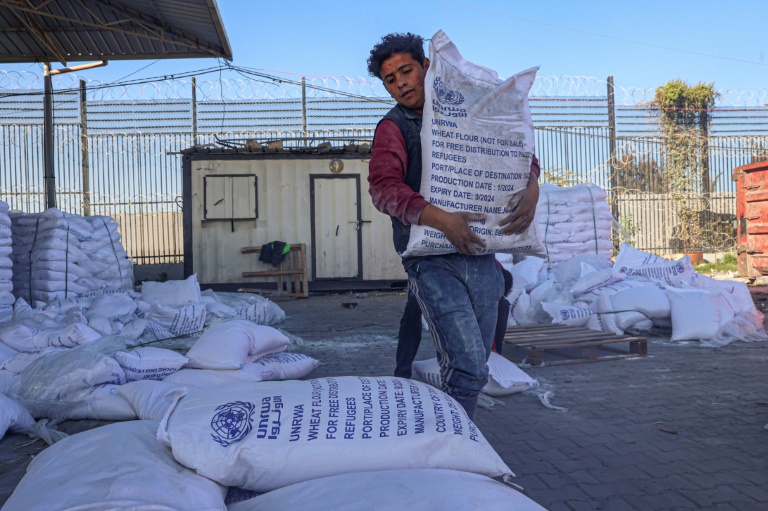How humanitarian aid reaches war-ravaged Gaza

Israel inspects all aid before it can enter the Hamas-ruled Gaza Strip
Jerusalem – Most humanitarian relief bound for the war-ravaged Gaza Strip arrives overland from neighbouring Egypt, but obstacles and delays have prompted other initiatives that aid groups warn may not be effective.
Truckloads of aid entering Gaza daily by road from the southern Rafah area are insufficient, UN and humanitarian workers say, blaming at least in part rigorous Israeli inspections.
With no truce in sight to stop the Israel-Hamas war, here is a look at how aid currently reaches Gaza and what alternatives are being weighed to alleviate the dire humanitarian crisis in the besieged Palestinian territory.
– First stop: Egypt –
Most Gaza-bound goods arrive in Egypt via the Mediterranean Sea, specifically the ports of Port Said or El-Arish.
El-Arish is closer to Gaza but also smaller, and was quickly overwhelmed by the volume of shipments arriving, according to NGOs.
Israeli authorities, who imposed a total blockade on the Palestinian territory after Hamas took control of it in 2007 and placed it under siege following the October 7 attack that triggered the war, require that all aid entering Gaza be inspected by them.
The main inspection area for goods is Kerem Shalom in southern Israel, across from Gaza’s southeast.
Another inspection area exists in Nitzana, about 40 kilometres (25 miles) southeast of Gaza on the Israeli-Egyptian border.
– Long wait for trucks –
Before reaching the inspection areas, many aid trucks wait for days at the Egyptian side of the Rafah checkpoint.
Once inspected, goods that are cleared to enter by Israel are unloaded from the mostly Egyptian trucks in the zone between Egypt and Gaza.
The supplies are then loaded onto separate vehicles, driven by Gazans working for NGOs, for distribution inside the Palestinian territory.
Cumbersome screenings are a major reason current shortages are so glaring, aid workers say.
Israel blames shortages on the Palestinian side, namely a lack of capacity to distribute aid once it gets in.
– Heading north –
For weeks, aid groups and foreign governments including top ally the United States have urged Israel to open routes to the north of Gaza, where the humanitarian crisis is most severe.
Israel announced that six World Food Programme (WFP) aid trucks entered directly from its territory into the north on Tuesday, in what was described as a “pilot project”.
Aid bound for Gaza’s north must otherwise come from the south on trips complicated by destruction and fighting.
Last week, the United Nations’s WFP said one of its convoys had been blocked by Israeli forces inside Gaza before it could reach the north.
After turning back, the agency said the convoy was looted by a “crowd of desperate people”.
According to Israeli authorities, 173 trucks reached northern Gaza in March.
This is fewer than the 207 trucks Israel said entered the Gaza Strip on Tuesday alone, still far below the amount aid groups say is needed to sustain the territory’s 2.4 million people.
– By air and by sea –
Arab and Western armies including from the United States, the United Arab Emirates, Jordan, France and Belgium have carried out aid airdrops over Gaza.
These operations have focused on getting aid to the north.
A planned maritime route between the Mediterranean island of Cyprus and Gaza has so far seen one vessel embarking on Tuesday, carrying 200 tonnes of aid.
According to Spanish charity Open Arms which operates the vessel, the cargo was “exhaustively” inspected by Israeli authorities before departure from the Cypriot port of Larnaca.
A second ship “with bigger capacity” is ready to leave from Larnaca but officials are waiting to see how the first trip goes, Cypriot Foreign Minister Constantinos Kombos said.
Both the air and sea aid options are seen as less efficient and reliable than overland delivery, and NGOs as well as the health ministry in Hamas-run Gaza have said they are inadequate.
Separately, Morocco announced on Tuesday it had sent 40 tonnes of aid to Ben Gurion airport near Tel Aviv for transfer through Israel to the Kerem Shalom crossing.
